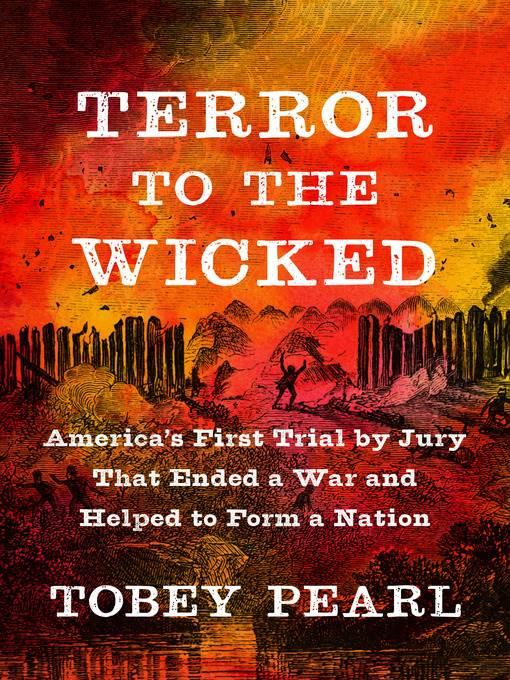
Terror to the Wicked
America's First Trial by Jury That Ended a War and Helped to Form a Nation
- اطلاعات
- نقد و بررسی
- دیدگاه کاربران
نقد و بررسی

January 25, 2021
Pearl, a lawyer by training, debuts with a painstaking yet accessible account of a consequential murder trial in 17th-century New England. In 1638, Penowanyanquis, a Nipmuc tribesman on a trading mission in Plymouth Colony, encountered a group of white indentured servants on a forest trail. The men, who had escaped their masters and planned to travel to the Dutch colony of New Amsterdam, had seen Penowanyanquis pass by their camp days earlier, and resolved to rob him. The gang’s leader, Arthur Peach, fatally stabbed the unarmed tribesman, but before he died, Penowanyanquis told Roger Williams, governor of Providence settlement, that he’d been attacked by “four English.” Peach and two of his companions were arrested, convicted by an all-white jury, and executed. Pearl argues that the verdict validated the jury system as a source of justice, paving the way for “a government for and of the people”; temporarily alleviated “the rampant fear and misgivings between settlers and indigenous tribes”; and helped bring an end to the Pequot War. Drawing extensively from primary sources, Pearl blends rigorous research with vivid storytelling and provides essential context for understanding the era. History buffs will be riveted.

January 15, 2021
A seemingly open-and-shut murder trial opens onto complex class and ethnic relations in the early Colonial era. In 1638, in the Plymouth Colony, a Nipmuc trader was robbed and stabbed by a gang of colonists. Before he died, he was able to tell the Colony's governor, Roger Williams, enough about the attack that authorities were able to arrest the culprits. That arrest and the subsequent legal proceedings, writes former attorney Pearl, are significant inasmuch as they represent "the Plymouth Colony's first significant murder trial." The trial placed several contending forces in motion, set against the background of a war involving colonists and Native people--and, to complicate matters, Native people who fought among themselves, with the trader likely one who "fought with his Narragansett allies in the Pequot War on the side of [the] colonists." That he spoke English and was an intermediary did not spare him from the assault perpetrated by a former soldier named Arthur Peach, who had camped with three other outlaws in the territory between the Wampanoag and Narragansett peoples in the hope of evading both, having fled from a servitude contract with a prominent colonist. In the end, the trial involved a cast of characters straight out of the history textbooks, from Williams to Myles Standish and the sachem Massasoit, who tried to intervene on Peach's behalf even as the jury also seemed inclined to take the renegade's side in the matter. Pearl sometimes overwrites ("His elders passed down countless stories involving brave sojourners unexpectedly tested by angered gods, tricksters, mischief makers, or monsters--and the man coming toward him, Arthur Peach, was a monster"), but her narrative makes a solid bookend to Jill Lepore's The Name of War in limning the complex relationships at work in a fraught place and time. A sturdy tale of Native-White relations in Colonial America that have echoes in Native legal struggles today.
COPYRIGHT(2021) Kirkus Reviews, ALL RIGHTS RESERVED.

March 1, 2021
Plymouth Colony, 1638. A Nipmuc man, Penowanyanquis, is killed by a group of escaped indentured servants led by Arthur Peach. The murder has ramifications for English and Indigenous relations, as well as intertribal relations between the Nipmuc, Wampanoag, and Narragansett nations. Pearl's background in law and international relations shines through in this work, as vivid details show the complicated social, political, and economic landscape of 17th-century New England. Governor Roger Williams (c. 1603-83) of Providence, RI, and Governor John Winthrop (1588-1649) of Massachusetts Bay Colony, important figures in the history of early New England, play critical roles. Governor Thomas Prence (1600-73) of Plymouth Colony, the stalwart Puritan known as "terror to the wicked," prosecuted the Peach gang for murder. At the trial in Plymouth, Narragansett men gave testimony, with Williams providing an Algonquian translation. The development of the British law system is contextualized, especially with regard to the growing autonomy of jurors empowered to make important decisions about their communities. Also discussed are topics concerning Indigenous and indentured servitude in early New England. VERDICT Advanced readers of American history, political science, and law will enjoy this detail-rich and erudite example of crime and justice in early America.--Jeffrey Meyer, Iowa Wesleyan Univ.
Copyright 2021 Library Journal, LLC Used with permission.

March 1, 2021
In 1638, Penowanyanquis, a Native American of the Nipmuc tribe, was brutally attacked by a gang led by Arthur Peach, a disgruntled white indentured servant. The Pequot War had already pitted area tribes against each other, and Puritan colonists made matters only worse. Mortally wounded, Penowanyanquis was taken to the nearest colonial settlement, where he died in the arms of none less than Roger Williams, founder of Rhode Island. Peach and his compatriots were identified and arrested. A trial ensued, and it was not an easy matter to empanel a jury of colonists who would try the case objectively. Moreover, Massasoit, revered sachem, threatened potential reprisals if Peach and his fellows were not convicted of the murder. Lawyer Pearl's detailed account of the nascent nation's first murder trial in Plymouth Colony tells not only how it set precedents for future legal procedures, but also how it remains remarkably relevant to today's struggle to ensure justice for all. Students of colonial American history and of legal history will find this engrossing. Includes a map, photographs, and bibliography.
COPYRIGHT(2021) Booklist, ALL RIGHTS RESERVED.




دیدگاه کاربران